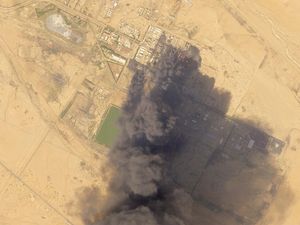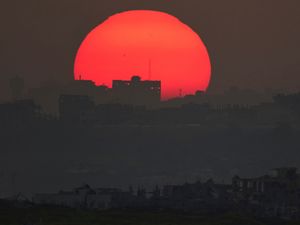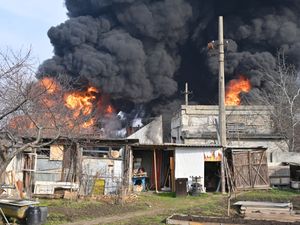Fighting in Sudan’s civil war sets ablaze the country’s largest oil refinery
International mediation attempts and pressure tactics have not halted the fighting.

Fighting around Sudan’s largest oil refinery set the sprawling complex ablaze, satellite data analysed by The Associated Press on Saturday shows.
The attacks around the refinery, owned by Sudan’s government and the state-run China National Petroleum Corp, represent the latest woe in a civil war between the rebel Rapid Support Force (RSF) and Sudan’s military, who blamed each other for the blaze.
International mediation attempts and pressure tactics, including a US assessment that the RSF and its proxies are committing genocide, have not halted the fighting.
The al-Jaili refinery sits some 40 miles north of Khartoum, the capital. The refinery has been subject to previous attacks as the RSF has claimed control of the facility since April 2023, as their forces had been guarding it. Local Sudanese media report the RSF also surrounded the refinery with fields of landmines to slow any advance.
But the facility, capable of handling 100,000 barrels of oil a day, remained broadly intact until Thursday.

An attack on Thursday at the oil field set fires across the complex, according to satellite data from Nasa satellites that track wildfires worldwide.
Satellite images taken by Planet Labs PBC on Friday for the AP showed vast areas of the refinery ablaze.
The images, shot just after 1200 GMT, showed flames shooting up into the sky in several spots. Oil tanks at the facility stood burned, covered in soot.
Thick plumes of black smoke towered over the site, carried south toward Khartoum by the wind. Exposure to that smoke can exacerbate respiratory problems and raise cancer risks.
In a statement released on Thursday, the Sudanese military alleged the RSF was responsible for the fire at the refinery.
The RSF “deliberately set fire to the Khartoum refinery in al-Jaili this morning in a desperate attempt to destroy the infrastructures of this country,” the statement read.
“This hateful behaviour reveals the extent of the criminality and decadence of this militia … (and) increases our determination to pursue it everywhere until we liberate every inch from their filth.”
The RSF for its part alleged on Thursday night that Sudanese military aircraft dropped “barrel bombs” on the facility, “completely destroying it”.
The RSF has claimed the Sudanese military uses old commercial cargo aircraft to drop barrel bombs, such as one that crashed under mysterious circumstances in October.
Neither the Sudanese military nor the RSF offered evidence to support their duelling allegations.
China, Sudan’s largest trading partner before the war, has not acknowledged the blaze at the refinery. The Chinese Foreign Ministry did not respond to a request for comment.
China moved into Sudan’s oil industry after Chevron Corp left in 1992 amid violence targeting oil workers in another civil war.
South Sudan broke away to become its own country in 2011, taking 75% of what had been Sudan’s oil reserves with it.
United Nations Secretary-General Antonio Guterres “is following with great concern the recent escalation of fighting in Sudan,” a statement from his office on Friday said, specifically mentioning the oil refinery attack.
“The secretary-general urges the parties to refrain from all actions that could have dangerous consequences for Sudan and the region, including serious economic and environmental implications,” the statement said.
Sudan has been unstable since a popular uprising forced the removal of long-time dictator Omar al-Bashir in 2019.
A short-lived transition to democracy was derailed when army chief general Abdel-Fattah Burhan and general Mohammed Hamdan Dagalo of the RSF joined forces to lead a military coup in October 2021.
Al-Bashir faces charges at the International Criminal Court over carrying out a genocidal campaign in the early 2000s in the western Darfur region with the Janjaweed, the precursor to the RSF.
Rights groups and the UN say the RSF and allied Arab militias are again attacking ethnic African groups in this war.
The RSF and Sudan’s military began fighting each other in April 2023.
Their conflict has killed more than 28,000 people, forced millions to flee their homes and left some families eating grass in a desperate attempt to survive as famine sweeps parts of the country.
Other estimates suggest a far higher death toll in the civil war.





